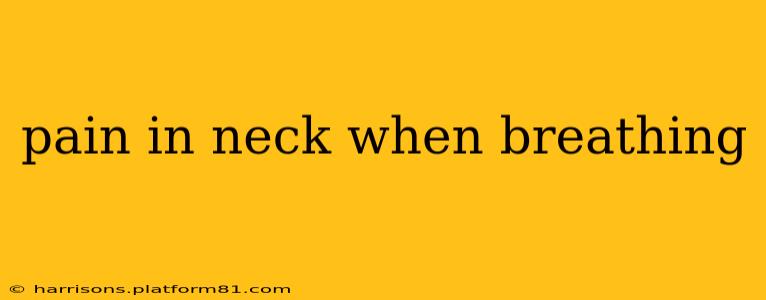Experiencing pain in your neck when you breathe can be alarming and disruptive. This symptom isn't a disease in itself, but rather a sign that something may be amiss. The pain can range from a dull ache to a sharp, stabbing sensation, and its location can vary depending on the underlying cause. This comprehensive guide will explore the potential reasons behind neck pain during breathing, how it's diagnosed, and effective treatment options.
What Causes Neck Pain When Breathing?
Several conditions can trigger neck pain that worsens with breathing. It's crucial to understand that self-diagnosing can be misleading, and professional medical evaluation is essential for accurate diagnosis and treatment. Some of the most common causes include:
1. Muscle Strain or Injury:
Neck muscles can become strained or injured through overuse, poor posture, sudden movements, or trauma. This can lead to pain that intensifies with deep breaths or specific neck movements. Activities like prolonged computer work, driving, or sleeping in an awkward position can contribute to muscle strain.
2. Cervical Spondylosis (Degenerative Disc Disease):
This common age-related condition involves the wear and tear of the discs in your neck. As the discs degenerate, they can irritate nerves and cause pain that radiates to the neck and can worsen with breathing, especially if the affected area is near the spinal nerves responsible for breathing mechanisms.
3. Arthritis:
Arthritis in the neck (cervical arthritis), such as osteoarthritis or rheumatoid arthritis, can inflame the joints in the neck, causing pain and stiffness that worsens with movement, including breathing. The inflammation can put pressure on nerves, exacerbating the discomfort.
4. Cervical Radiculopathy (Pinched Nerve):
A pinched nerve in the neck can result in pain that radiates down the arm and into the neck. Breathing deeply can further irritate the nerve, increasing the pain. This can be caused by conditions like disc herniation, bone spurs, or spinal stenosis.
5. Temporomandibular Joint (TMJ) Disorders:
TMJ disorders affect the jaw joint, but they can sometimes cause referred pain to the neck. The muscles controlling jaw movement are interconnected with neck muscles; hence, TMJ problems can trigger neck pain that worsens with breathing or jaw movement.
6. Zoster (Shingles):
The varicella-zoster virus, responsible for chickenpox, can later reactivate as shingles. If the virus affects the nerves in the neck, it can cause severe pain along the affected nerve dermatome, intensifying with breathing or other movements.
How is Neck Pain When Breathing Diagnosed?
A thorough medical history and physical examination are vital for diagnosing the cause of neck pain during breathing. Your doctor will ask about your symptoms, medical history, and any recent injuries. A physical exam will assess your range of motion, reflexes, and neurological function. Additional diagnostic tests may be ordered, including:
- X-rays: To visualize the bones and joints in your neck.
- MRI: To provide detailed images of the soft tissues, including discs, nerves, and muscles.
- CT scan: To create cross-sectional images of the neck.
- EMG/NCS (Electromyography/Nerve Conduction Studies): To assess nerve function.
What Treatments are Available for Neck Pain When Breathing?
Treatment depends on the underlying cause of the pain. Options may include:
- Pain relievers: Over-the-counter medications like ibuprofen or acetaminophen can help manage pain and inflammation. Your doctor may prescribe stronger pain relievers in some cases.
- Muscle relaxants: These medications can help relieve muscle spasms.
- Physical therapy: Exercises and stretches can help improve neck mobility, strengthen muscles, and improve posture.
- Massage therapy: Can help relax tense muscles and alleviate pain.
- Chiropractic care: Adjustments can help improve spinal alignment and reduce pain.
- Injections: Steroid injections can help reduce inflammation in the neck.
- Surgery: In rare cases, surgery may be necessary to address underlying conditions such as disc herniation or spinal stenosis.
Can Poor Posture Cause Neck Pain When Breathing?
Yes, poor posture can significantly contribute to neck pain, especially when combined with deep breathing. Slouching or hunching over puts extra strain on the neck muscles, making them more susceptible to injury and pain. Maintaining good posture, with your shoulders back and your head aligned over your spine, helps distribute weight evenly and prevents excessive strain on the neck muscles during respiration.
How Can I Prevent Neck Pain When Breathing?
Preventing neck pain involves a multifaceted approach:
- Maintain good posture: Pay attention to your posture throughout the day, whether sitting, standing, or sleeping.
- Regular exercise: Strengthens neck and back muscles to provide better support and reduce strain.
- Ergonomic setup: Ensure your workstation is ergonomically designed to support good posture.
- Stress management: Stress can tighten neck muscles, leading to pain. Incorporate relaxation techniques.
- Gentle stretching: Regularly stretch your neck muscles to improve flexibility and reduce stiffness.
- Avoid sudden movements: Protect your neck from sudden movements or jarring impacts.
Disclaimer: This information is for general knowledge and does not constitute medical advice. Always consult a healthcare professional for any health concerns or before making any decisions related to your health or treatment.
